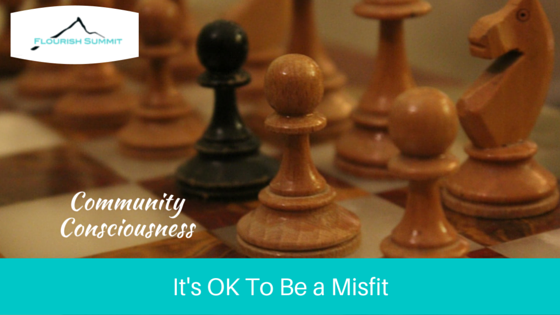Community consciousness is ubiquitous, like the air we breathe. It instantly judges what is right and wrong, good and bad, acceptable and unacceptable. People whose thinking falls within the community consciousness hardly even notice that these judgments and assumptions are present because they seem so obvious, natural, and “universal.” If you are outside of these “norms” however, you are deemed a misfit.
Community consciousness can be on a small scale, like the consciousness of a certain gang or family, or a larger scale, like the prevalent consciousness of a culture or country. If you look at conventional community consciousness in the U.S. today, it’s clear that certain underlying assumptions pervade the way most people think: “The best defense is a good offense.” “It takes money to make money.” “It’s a dog- eat-dog world.” “Happiness is achieving the American Dream.” “You have to look good, smell good, and have brilliantly white teeth to be loved.” I’m sure you can think of a million other examples. These are the underlying assumptions the mass media and corporate America would have us buy into, and many people build their lives around them.
We experience both positive and negative effects from these various sectors of community consciousness. If the assumptions support who we are and encourage our growth, it is positive. Conventional thinkers slip easily into the community consciousness and they can experience acceptance and growth within the community without difficulty. But unconventional thinkers are outliers of the community who often run counter to its consciousness and find themselves struggling.
Unconventional thinkers don’t fall in with the prevalent community consciousness because they see and approach life differently. From the time of their birth, they don’t function the way most others function. According to the conventional community, this means that unconventional thinkers are “wrong” or “bad.” For its survival, the community isolates these “wrongdoers” so that others will not be infected, or it punishes those who are “bad” in an attempt to bring them back into the fold. The community exerts all kinds of peer pressure to make everyone toe the line and fall into lock step. It’s just a normal human mechanism designed to protect the tribe.
However, even if he is beaten into submission, an unconventional thinker can never really fit into the conventional community. He can’t change the DNA of his thinking any more than he can change the color of his skin or his blood type. But because the community rejects their perspectives, many unconventional thinkers end up beating themselves up and feeling like they’re misfits, maladjusted, and useless.
Personally, I recognized that I didn’t “fit in” very early in life. As a child and especially a teenager, I acted out a lot and rebelled. I knew I couldn’t be like everyone else and didn’t want to be. But I was frustrated and angry because I hadn’t yet embraced who I really was. My real gift was seeing how things could be better than they were – but most people in my school years and early in my career didn’t want to hear about it. It wasn’t until I was in college that I began to connect the dots and recognize how I was different. I was able to be successful and “play the game” to a certain extent, but never felt satisfied. It was only later in life that I felt like I came fully into my own potential, and it took a lot of personal development work to release some of the negativity of my past to reach that potential. So, yes, I am a misfit and glad that I am because I have served the world in a much bigger way than if I had followed the community consciousness.
